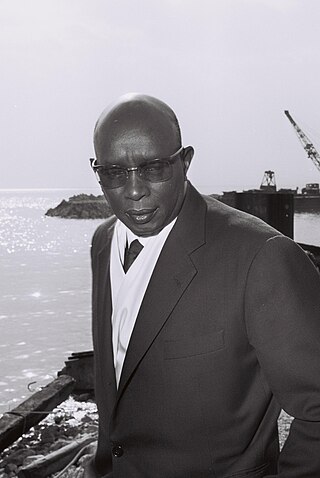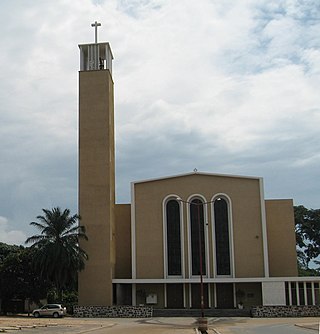Related Research Articles

Mwambutsa IV Bangiricenge was the penultimate king (mwami) of Burundi who ruled between 1915 and 1966. He succeeded to the throne on the death of his father Mutaga IV Mbikije. Born while Burundi was under German colonial rule, Mwambutsa's reign mostly coincided with Belgian colonial rule (1916–62). The Belgians retained the monarchs of both Rwanda and Burundi under the policy of indirect rule.

Football in Burundi has been affected by the civil war that broke out in Burundi. Before that, Burundi football had been doing well. Football is the most popular sport in Burundi.

The Burundi national football team,, nicknamed The Swallows, represents Burundi in international football and is controlled by the Football Federation of Burundi. The team has never qualified for the World Cup. Burundi previously did come very close to qualifying for the 1994 Africa Cup of Nations, losing only on penalties to Guinea in a playoff. However, in 2019, it qualified for the first time, and took part in the Africa Cup of Nations finals in Group B, but lost all its matches and left from the group stage without scoring a single goal.

Ruanda-Urundi, later Rwanda-Burundi, was a geopolitical entity, once part of German East Africa, that was occupied by troops from the Belgian Congo during the East African campaign in World War I and was administered by Belgium under military occupation from 1916 to 1922. It was subsequently awarded to Belgium as a Class-B Mandate under the League of Nations in 1922 and became a Trust Territory of the United Nations in the aftermath of World War II and the dissolution of the League. In 1962 Ruanda-Urundi became the two independent states of Rwanda and Burundi.

Pierre Nkurunziza was a Burundian politician who served as the ninth president of Burundi for almost 15 years from August 2005 until his death in June 2020.

The Kingdom of Burundi, also known as Kingdom of Urundi, was a Bantu kingdom in the modern-day Republic of Burundi. The Ganwa monarchs ruled over both Hutus and Tutsis. Created in the 16th century, the kingdom was preserved under German and Belgian colonial rule in the late 19th and early 20th century and was an independent state between 1962 and 1966.

The University of Burundi is a public university located in Bujumbura, Burundi. Founded in 1964, it comprises eight faculties and five institutes and has a student enrollment of approximately 13,000. It is based in three campuses in Bujumbura and a fourth in Gitega. It took its current name in 1977 and is Burundi's only publicly funded university.

The culture of Burundi is based on local tradition and common influence with its neighbors.

The Association des Guides du Burundi is the national Guiding organization of Burundi. As of 2018 there were 12,350 members. Founded in 1954, the girls-only organization became an associate member of the World Association of Girl Guides and Girl Scouts in 1972 and a full member in 2008.
The Scout and Guide movement in Burundi is served by two organisations

Lesbian, gay, bisexual, and transgender (LGBT) people in Burundi face legal challenges not experienced by non-LGBTQ citizens. While never criminalized before 2009, Burundi has since criminalized same-sex sexual activity by both men and women with a penalty up to two years in prison and a fine. LGBT persons are regularly prosecuted and persecuted by the government and additionally face stigmatisation among the broader population.

Dora Mwima, also Dorah Mwima is a Ugandan model and beauty pageant titleholder who was crowned Miss Uganda 2008 at the age of 18. She represented Uganda in Miss World 2008 in South Africa.

Burundi, officially the Republic of Burundi, is a landlocked country in the Great Rift Valley at the junction between the African Great Lakes region and Southeast Africa. It is bordered by Rwanda to the north, Tanzania to the east and southeast, and the Democratic Republic of the Congo to the west; Lake Tanganyika lies along its southwestern border. The capital city is Gitega and the largest city is Bujumbura.

Religion in Burundi is diverse, with Christianity being the dominant faith. Catholicism is the largest Christian denomination in the country.
Burundi ratified the 2000 UN TIP Protocol in May 2012.

The Burundi women's national football team, nicknamed the Swallows, represents Burundi in women's international football competitions. The team has competed since 2016 in matches recognised by FIFA, the sport's international governing body. A senior national team has been continually inactive, but an under-20 team has played in numerous matches. Further development of football in the country faces challenges found across Africa, including inequality and limited access to education for women. A women's football programme did not exist in Burundi until 2000, and only 455 players had registered for participation on the national level by 2006.
Prostitution in Burundi is illegal but is commonplace and on the rise. Prostitution is prevalent in all areas of the country, and especially in the largest city, Bujumbura, and prior to the security crisis in 2015, the tourist areas around Lake Tanganyika. UNAIDS estimate there are 51,000 prostitutes in Burundi. Many women have turned to prostitution due to poverty. Previously law enforcement made little effort to curb prostitution. Political pressures, including from the mayor of Bujumbura, Freddy Mbonimpa, have led to crackdowns all over the country.

Burundi competed at the 2014 Summer Youth Olympics, in Nanjing, China from 16 August to 28 August 2014.
Clotilde Niragira was a Burundian politician and lawyer. She served as head of three separate ministries in Pierre Nkurunziza's government and was Secretary-General of Burundi's Truth and Reconciliation Commission.